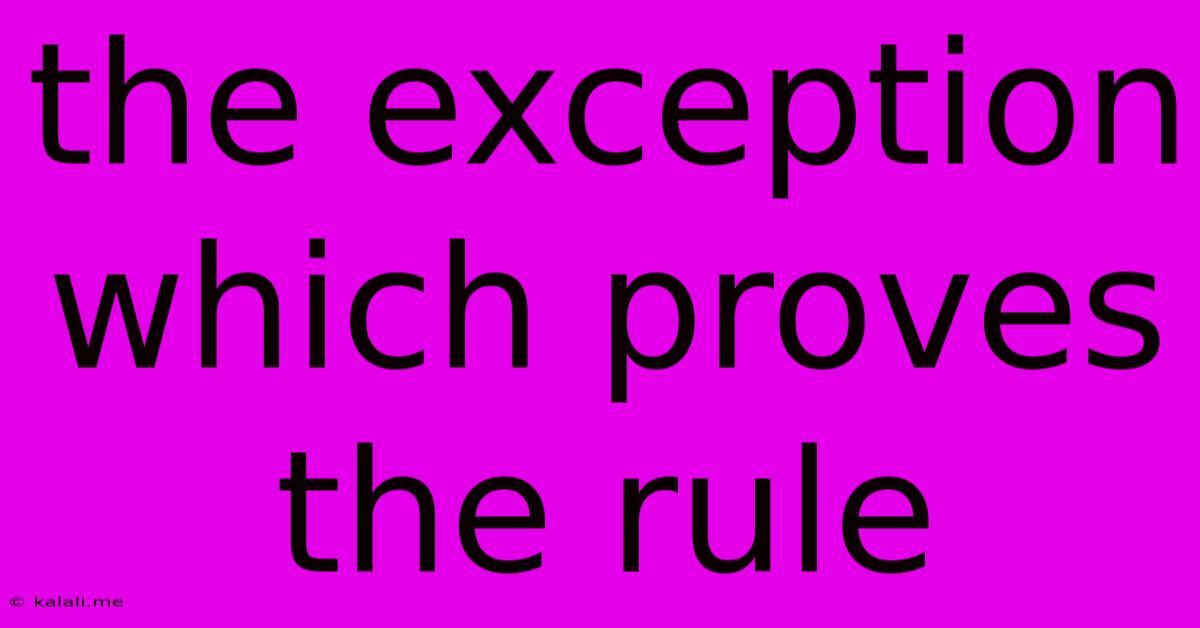The Exception Which Proves The Rule
Kalali
May 19, 2025 · 3 min read

Table of Contents
The Exception That Proves the Rule: Unpacking a Common Misconception
The phrase "the exception that proves the rule" is thrown around frequently, often casually and incorrectly. This article will delve into the true meaning of this idiom, explore its historical context, and clarify why its common usage is, in fact, a misinterpretation. Understanding this nuance is crucial for clear communication and avoiding logical fallacies.
The seemingly paradoxical nature of the phrase leads to its frequent misuse. Many believe it supports the idea that an exception confirms the validity of a rule. This is incorrect. The modern understanding of the phrase is far removed from its original meaning.
The Historical Context: A Shift in Meaning
The expression originates from a misunderstanding of the historical use of the word "prove." In 16th and 17th-century English, "prove" meant "to test," "to try," or "to put to the test." Therefore, the "exception that proves the rule" didn't mean that the exception confirmed the rule but rather that the exception tested the rule. The exception acted as a trial or examination of the rule's boundaries and limitations. It didn't validate the rule, but rather illuminated its scope.
Consider a rule like, "Most swans are white." The discovery of a black swan wouldn't prove the rule "Most swans are white" to be true; instead, it would highlight the existence of exceptions to the rule and refine our understanding of swan coloration. The black swan acts as an exception that tests the rule, showing where the rule's boundaries lie.
Why the Misunderstanding Persists
The shift in the meaning of "prove" over time is the primary reason for the continued misinterpretation. The modern definition of "prove" implies confirmation or validation. This modern understanding clashes directly with the historical context of the phrase.
The misuse of the idiom often leads to faulty reasoning. It's crucial to remember that a single exception rarely, if ever, disproves a general rule, especially when dealing with probabilistic statements. However, exceptions are vital for refining, clarifying, and improving upon generalizations.
Modern Usage and Alternatives
In modern usage, it’s best to avoid the phrase altogether. It's inherently ambiguous and easily misinterpreted. Instead of saying, "The exception that proves the rule," opt for clearer alternatives that accurately convey your intended meaning. Here are a few options:
- "The exception highlights the rule's limitations." This clearly indicates that the exception clarifies the scope of the rule.
- "This case illustrates the rule's exceptions." This emphasizes the existence of exceptions without implying that they validate the rule.
- "This is an example of when the rule doesn't apply." This is a straightforward and unambiguous way to express the exception.
In conclusion, the phrase "the exception that proves the rule" is a misleading idiom based on an outdated understanding of the word "prove." While historically it referred to an exception testing the boundaries of a rule, its modern interpretation is often inaccurate and leads to flawed logic. For clear and precise communication, it's always best to choose more direct and unambiguous language. Understanding this historical nuance allows for more precise communication and prevents logical fallacies in our arguments.
Latest Posts
Latest Posts
-
Can You Start A Sentence With You
May 19, 2025
-
Meaning Of Wax On Wax Off
May 19, 2025
-
Man In The High Castle Map
May 19, 2025
-
Why Does My Steering Wheel Shake At High Speeds
May 19, 2025
-
How To Dial To Italy From Uk
May 19, 2025
Related Post
Thank you for visiting our website which covers about The Exception Which Proves The Rule . We hope the information provided has been useful to you. Feel free to contact us if you have any questions or need further assistance. See you next time and don't miss to bookmark.